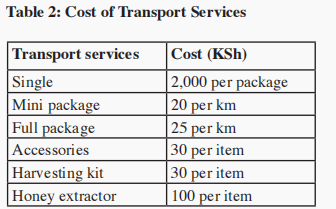2022 PROJECT
KCSE 2022 Computer Studies Project: Nekta Management System
Instructions to candidates
QuestionNekta is a company that deals with beekeeping and selling of honey. The
company offers the following services:- selling of beehives and associated accessories to bee farmers;
- setting up of the beehives for the bee farmers;
- offering of training on beekeeping;
- buying of honey-related products from farmers for resale.
The company sells beekeeping accessories in three packages namely:
single hive, mini package and full package as
per the following descriptions:
- A single hive is one beehive and its associated accessories for setting
up.
- A mini package consists of six beehives, harvesting accessories, beehive
setting up and
- training for one person for one day.
- A full package consists of twelve beehives and a honey extractor. It
also includes training for
- two people for one day and honey harvesting kit for two people.
The cost of each of
the packages is as shown in Table 1:

Nekta Management System project Table 1: Cost of the packages
Other services offered by the company are:
- training at a cost of KSh 7,000 per person;
- sale of accessories at KSh 2,500 per unit;
- sale of honey harvesting kits at KSh 600 per unit;
- sale of honey extractors at KSh 13,000 per unit.
The company also buys honey from farmers at KSh 900 per kg and bee
products at KSh 1,200 per kg, for further
processing and subsequent sales to consumers. A farmer whose sales are below
KSh 20,000 is paid in cash, while sales between KSh 20,000 and KSh 80,000 are paid
by mobile money transfer. Any sales
exceeding KSh 80,000 are paid via Electronic Funds Transfer (EFT).
A farmer seeking services from the
company is required to provide personal details. The details are captured and
the farmer is required to make full payments for the services sought. Once the payment has been verified, services are
approved and offered. If the payment is for training
services, the trainee is then provided with the training schedule.
The company also provides transport services to farmers and are charged
based on the destination and the quantity of the items as shown in Table 2:

Nekta Management System project Table 2: Cost of transport services
The
company intends to use a database to manage their operations. Develop a
well-documented computerised
database system for the company that would:
- Maintain records of bee farmers;
- Maintain records of trainee
farmers;
- Maintain records of services
rendered and products sold by the company;
- Capture payments for each
package;
- Capture income from various sales
and training services;
- Capture details of purchases from
farmers;
- Compute each of the following:
a)
payments for the services to farmers;
b)
payments made to farmers for honey deliveries;
c)
total sales to clients;
d)
transport earnings;
e)
income from training;
f)
total income for the company;
- Generate appropriate reports.
- selling of beehives and associated accessories to bee farmers;
- setting up of the beehives for the bee farmers;
- offering of training on beekeeping;
- buying of honey-related products from farmers for resale.
The company sells beekeeping accessories in three packages namely:
single hive, mini package and full package as
per the following descriptions:
- A single hive is one beehive and its associated accessories for setting up.
- A mini package consists of six beehives, harvesting accessories, beehive setting up and
- training for one person for one day.
- A full package consists of twelve beehives and a honey extractor. It also includes training for
- two people for one day and honey harvesting kit for two people.
The cost of each of the packages is as shown in Table 1:
 |
| Nekta Management System project Table 1: Cost of the packages |
Other services offered by the company are:
- training at a cost of KSh 7,000 per person;
- sale of accessories at KSh 2,500 per unit;
- sale of honey harvesting kits at KSh 600 per unit;
- sale of honey extractors at KSh 13,000 per unit.
The company also buys honey from farmers at KSh 900 per kg and bee
products at KSh 1,200 per kg, for further
processing and subsequent sales to consumers. A farmer whose sales are below
KSh 20,000 is paid in cash, while sales between KSh 20,000 and KSh 80,000 are paid
by mobile money transfer. Any sales
exceeding KSh 80,000 are paid via Electronic Funds Transfer (EFT).
A farmer seeking services from the
company is required to provide personal details. The details are captured and
the farmer is required to make full payments for the services sought. Once the payment has been verified, services are
approved and offered. If the payment is for training
services, the trainee is then provided with the training schedule.
The company also provides transport services to farmers and are charged based on the destination and the quantity of the items as shown in Table 2:
 |
| Nekta Management System project Table 2: Cost of transport services |
The company intends to use a database to manage their operations. Develop a well-documented computerised database system for the company that would:
- Maintain records of bee farmers;
- Maintain records of trainee farmers;
- Maintain records of services rendered and products sold by the company;
- Capture payments for each package;
- Capture income from various sales and training services;
- Capture details of purchases from farmers;
- Compute each of the following:
a) payments for the services to farmers;
b) payments made to farmers for honey deliveries;
c) total sales to clients;
d) transport earnings;
e) income from training;
f) total income for the company;
- Generate appropriate reports.